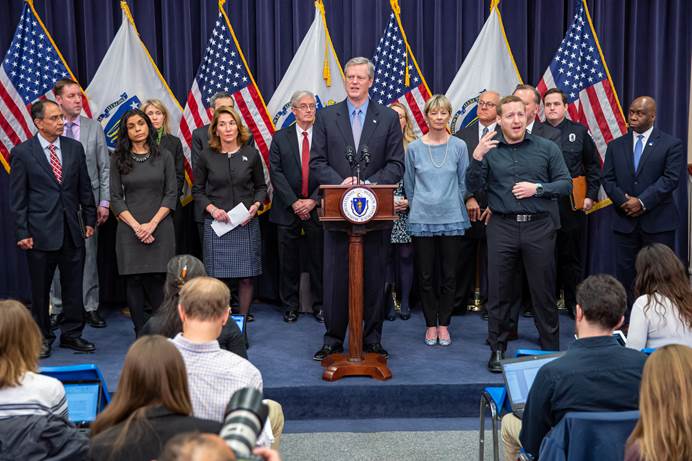Community
Governor Baker, health officials, isssue update on COVID-19 as 249 are quarantined

BOSTON — Today, the Baker-Polito Administration convened a meeting with front-line leaders representing hospitals, local public health boards, emergency response, long-term care, and higher education to discuss ongoing preparations for Coronavirus (COVID-19) in Massachusetts. Governor Charlie Baker was joined by Health and Human Services Secretary Marylou Sudders, Department of Public Health Commissioner Dr. Monica Bharel, MBTA General Manager Steve Poftak and Massport CEO Lisa Wieland.
Leaders joining Governor Baker and administration officials included: Chief of the Division of Emergency Preparedness at Mass General Hospital and Director of the Mass General Hospital Center for Disaster Medicine Dr. Paul Biddinger, Director of Infection Control and Hospital Epidemiologist at UMass Medical Center Dr. Richard Ellison III, Chief Public Health Office at Cambridge Public Health Department Claude-Alix Jacob, University of Massachusetts Amherst Chancellor Kumble Subbaswamy, Manager of the Metro Regional Preparedness Coalition at the Cambridge Health Alliance Jendy Dunlop, Director of Special Projects for ProEMS Ambulance Service Gibson McCullagh, and Louis J. Woolf, President and CEO of Hebrew Senior Life.
“Our administration’s top priority continues to be the health and safety of Massachusetts residents, and our ongoing collaboration with medical experts, first responders, school officials, local public health leaders and other stakeholders is a crucial part of our ongoing preparedness efforts,” said Governor Charlie Baker. “While the risk for COVID-19 in Massachusetts remains low, our partnership with these organizations and leaders is crucial to ensuring that the Commonwealth remains safe and prepared.”
“We appreciate our ongoing collaboration with a wide range of organizations as we work together to ensure Massachusetts remains prepared for a potential outbreak of COVID-19,” said Lt. Governor Karyn Polito. “Our administration is committed to remaining a resource for entities on the front lines of the Commonwealth’s ongoing preparedness efforts.”
“The Department of Public Health has been working closely with the CDC since the beginning of the outbreak in China, and has worked tirelessly to plan and communicate with state and local partners to prepare our communities and share specific strategies all of us can take to stay healthy,” said Secretary Marylou Sudders.
Yesterday, the Department of Public Health held its second conference call with local colleges and universities, in part to address questions and concerns about upcoming international travel for universities, like study abroad programs, which often require significant planning and investment. With this in mind, the administration is urging colleges, universities and high schools to cancel upcoming, organized international trips at this time.
“The Department of Public Health continues to monitor this dynamic situation and we have been coordinating with a wide range of stakeholders, including educational institutions that frequently sponsor, organize, or are associated with individual and group international travel,” said DPH Commissioner Dr. Monica Bharel. “While the risk of COVID-19 is low in Massachusetts, the administration strongly urges schools to cancel all upcoming organized international travel for the foreseeable future.”
Earlier today, the CDC issued an updated Travel Health Alert for all United States residents starting today, instructing travelers returning from countries with a Level 3 alert (currently China, South Korea, Iran, and Italy) to stay home and monitor their health for 14 days after returning to the US. This guidance also instructs travelers from countries with a Level 2 alert (currently Japan) to monitor their health and limit interactions with others for 14 days after returning to the US. The guidance advises against any non-essential travel to Level 3 countries. The Department of Public Health will be issuing more detailed guidance related to this development shortly.
The Massachusetts Department of Public Health (DPH) announced its first confirmed case of COVID-19 in early February and on Monday, DPH announced its first presumptive positive case of COVID-19 since the FDA approved testing at the State Public Health Laboratory on February 28th, with results being confirmed by the CDC. This morning, DPH announced 719 people who did not show symptoms of COVID-19 have been in self-quarantine in their homes following international travel and/or contact with individuals who have been exposed to the virus, with 470 of those individuals completed monitoring and are no longer quarantined and 249 are currently quarantined. This information will be posted online today.
Coronaviruses are respiratory viruses and are generally spread through respiratory secretions (droplets from coughs and sneezes) of an infected person to another person. Symptoms of COVID-19 include fever, cough and shortness of breath, and, in severe cases, pneumonia (fluid in the lungs). Information is still limited about how this novel coronavirus spreads.
There have been more than 100 U.S. cases of COVID-19 confirmed since January. Globally, more than 90,000 cases have been confirmed. Late Tuesday, the CDC reported a total of 9 COVID-19-related deaths in the U.S.
Although the risk of COVID-19 to Massachusetts residents remains low, and the risk of the flu is high, people are advised to take many of the same steps they do to help prevent colds and the flu, including:
Wash hands often with soap and warm water for at least 20 seconds.
Avoid touching your eyes and face.
Clean things that are frequently touched (like doorknobs and countertops) with household cleaning spray or wipes.
Cover coughs and sneezes with a tissue or the inside of your elbow.
Stay home when feeling sick.
Stay informed.
Get a flu shot.
Clinicians who have patients they think may have symptoms consistent with COVID-19 should contact DPH via the 24/7 EPI line (617-983-6800).
The State Lab has an adequate supply of test kits from the CDC for testing. The anticipated turnaround of test results from the State Lab is 24 hours, depending on testing volume.
Individuals who are in voluntary self-quarantine continue to be monitored by their local boards of health.
People who have recently traveled from an area with widespread or ongoing community spread of COVID-19 and who have symptoms of the disease (fever, cough, shortness of breath) should immediately contact their healthcare provider immediately and call ahead before going to a healthcare facility.
-

 Community7 years ago
Community7 years agoNational Shrine of La Salette Festival of Lights 2017 set to begin
-

 Community6 years ago
Community6 years agoMassachusetts State Police looking for good home for retired dogs
-

 Crime6 years ago
Crime6 years agoFall River ranked most dangerous city in Massachusetts according to report
-

 latest7 years ago
latest7 years agoDurfee student allegedly overdoses on marijuana
-

 Community6 years ago
Community6 years agoVideo of Fall River Police goes viral
-

 Causes6 years ago
Causes6 years agoMissing Fall River woman found deceased
-

 Crime6 years ago
Crime6 years agoFall River Police add names to most wanted list
-

 Causes6 years ago
Causes6 years agoFall River teenager reported missing has been found




